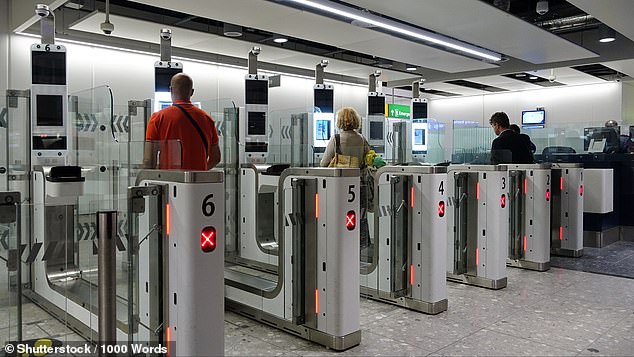British holidaymakers could use EU passport control lanes on the Continent again under the new deal with Europe struck yesterday – but only if member states agree to make the changes.
Sir Keir Starmer said the agreement would allow UK travellers to go through EU ‘e-gates’ rather than manual passport checks, ‘ending those huge queues at passport control’.
And No 10’s official X account said British nationals ‘will now be able to use e-gates… so you can start your holiday sooner’.
However, it will be up to EU member states to update their border security checks and decide when to introduce it. The move will also depend on the introduction of the EU’s new Entry/Exit System (EES), which will require travellers to give their fingerprints and pay a £6 fee.
Asked when Britons may be able to use e-gates, the Prime Minister said: ‘I want it done as soon as possible, and that’s why I urge EU member states now to do it.’
A Government official said member states had been using ‘slightly different interpretations’ of EU border control rules until now, and the new deal made clear there was ‘no legal obstacle’ to UK citizens using e-gates.
The official summit statement said there would be ‘potential use of e-gates where appropriate’, adding there would be no legal bar on UK nationals using them ‘after the introduction of the EES’.
Yesterday’s agreement also set out how Brussels will work more closely with the UK to combat illegal immigration and crime.

British holidaymakers could use EU passport control lanes on the Continent again under the new deal with Europe struck yesterday (file photo)

Sir Keir Starmer, pictured on Monday, has been accused of ‘a great Brexit betrayal’
It said they would ‘explore ways’ to exchange fingerprints, DNA, criminal records of third country nationals and facial recognition imagery.
On illegal immigration, the PM said yesterday: ‘The previous deal left a huge gap in our ability to work together to tackle illegal migration.
So this deal closes that gap so we can work across migration routes to end the crisis and smash the criminal gangs.’
However, the summit agreement did not go into detail on the matter besides stating the two parties ‘should work together on practical and innovative approaches to reduce irregular migration’ and setting out aims for ‘closer co-operation’.
The deal also did not outline renewed British access to the EU’s asylum fingerprint database, Eurodac, which officials said would play a vital role in identifying illegal migrants who previously claimed refugee status on the Continent.
It comes as Keir Starmer was accused of a great Brexit betrayal last night after agreeing a death that hands Brussels control of British laws, money and fish.
The Prime Minister faced a furious backlash over a ‘surrender pact’ that will make Britain a ‘rule-taker’, forced to follow EU diktats with no say over them.
Sir Keir agreed to restart payments to the EU budget which could run into hundreds of millions of pounds a year. And, to the fury of Britain’s beleaguered fishermen, he caved in to French demands to allow access for EU trawlers until at least 2038 – more than 20 years after the public voted to take back control.
The agreement also paves the way for a ‘youth mobility deal’ which could eventually grant 80 million young Europeans the right to live and work temporarily in the UK.











